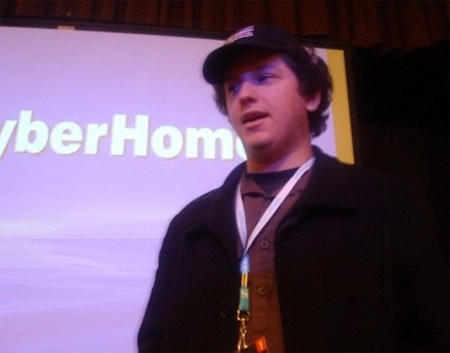
I came across a short film titled The Music of Erich Zann while attending the Rhode Island International Horror Film Festival in October of last year. The 35-minute film is based on a short story by H.P. Lovecraft about a young man who becomes fascinated with an elderly musician living in the apartment above him. The film’s haunting nature and striking cinematography have stuck with me since that initial viewing, especially given the project’s small budget and production team, so as you can imagine I was very excited when I had the opportunity to speak with Jared Skolnick, the man responsible for adapting Lovecraft’s story in this short film.
Below is a transcript of my interview with Jared in which we discuss his film, The Music of Erich Zann, as well as various aspects of independent filmmaking, including the necessity of multitasking, how it felt for him to bring his ideas to life on screen, audience reaction, and much, much more. For more information on Jared Skolnick and The Music of Erich Zann, visit the film’s official IMDb web site, where you can also watch the entire short film free of charge.
Paige MacGregor: You played various roles in the creation of your short film, The Music of Erich Zann, including director, writer, an actor, and editor. Can you tell our readers a bit about how you became involved in all of these various activities?
Jared Skolnick: The film is based on a short story by H.P. Lovecraft, an author I had always wanted to direct an adaptation of. Though it was wonderful on the page, I realized early on that simply doing a direct translation onto the screen wouldn’t be as vivid, as much of it unfolds as internal dialogue by the main character, Howard. Simply having him stare at things while narrating wouldn’t be very interesting, so I had to figure out a way to externalize his thoughts, which is why I added new characters and expanded the storyline. For example, the character I played, John, was simply a means for Howard to express himself and his conflicts without going into dry narration, which in my opinion hurts a lot of Lovecraft adaptations. His language is beautiful to read, but comes off as hokey when spoken aloud.
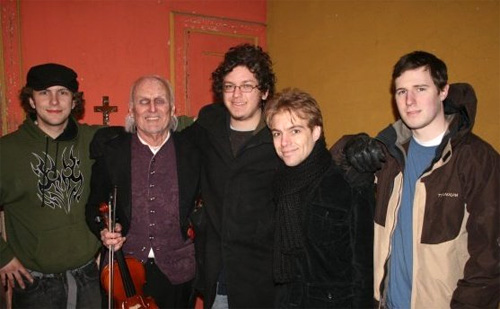
My other roles in the production were created out of necessity, really. I hadn’t planned on acting in the film, but the day that scene was to be shot, the actor never showed up! Since everyone else in the crew had their hands tied, I had no choice but to act it out myself. I would have preferred that an actual actor do the role, but no one’s walked up and punched me yet, so I assume my work is tolerable.
The post-production schedule was extremely rushed in order to have the film finished before its May deadline, so in order to get it done while still creating a final product similar to what I envisioned, I decided to just do it myself and eliminate the middleman. It was a little crazy, but seeing the end result is worth the stress that comes before it.
PM: During the creation of short, independent films like yours, the individuals involved often must take part in virtually every aspect of the film’s production, from acting and directing to casting and special effects. What was it like to have such a hands-on role in creating your film?
JS: A lot of fun, actually! One of the most important things a person should learn while they’re in film school is how every element of the production works, even the ones they don’t participate in themselves. I feel really lucky that I was put in a situation where I had to put on so many hats at once, even though at the time I would have said otherwise. It really helped me understand how the different departments collaborate and overlap, and even realize where a lot of tension and on-set conflict can come from. A director shouldn’t have to be an expert on cinematography or capturing sound, but it definitely benefits to have at least a rudimentary understanding of it.
Taking on so many roles for Zann helped me become more aware of how a set works, and I had a blast doing it. Aside from the writing process, which is torture for me, there wasn’t a job I had on the film that I didn’t enjoy every minute of.
PM: Can you describe for our readers what The Music of Erich Zann is about and how you first became inspired to write the film?
JS: The Music of Erich Zann is a horror film about a young student who moves into a decrepit apartment in the middle of a city. Every night he hears a beautiful, otherworldly music coming from the apartment above him. He finds that the man playing the music is a mute violinist named Erich Zann, who only leaves his room to play at a cheap theater every night. Judging Zann to be some kind of mad genius, the student becomes obsessed with him and his music, determined to discover why such a brilliant artist would choose to live in such squalor. I won’t spoil the result of his pursuits, but this being a horror film, and a Lovecraft film at that, you can guess it doesn’t end well.
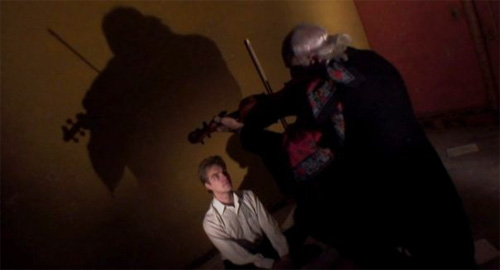
I’ve wanted to make a Lovecraft film since high school, but unfortunately his stories aren’t easy to put on the screen, especially for as low a budget as this film had. Zann was an exception to this, however, because its finale manages to be just as terrifying without depending on over-explicit descriptions of monsters from The Beyond. It was a great opportunity to explore the Lovecraftian mood on the cheap, relying only on atmosphere and the imagination of the viewer to create scares. Also, the story lent itself very well to an Expressionistic visual aesthetic, something I had also wanted to experiment with.
One problem I’ve always had with Lovecraft adaptations was that they always got the monsters down, but they never had the mood, that sense of almost nihilistic dread that punches you in the gut when you read his stories. With Zann I wanted to see if it was actually something that could be pulled off in cinema, or if his style is simply better suited for the page.
PM: Can you discuss briefly what was involved in moving from a short independent film script to a completed short film?
JS: It involved a strong combination of determination, thriftiness and collaboration from everyone in the cast and crew. Preproduction was often compromised due to false starts and uncertainties in securing production materials. Shooting conditions were always unfavorable if not downright hostile, and postproduction was forced to move at a breakneck speed, so there was always a chance that it wouldn’t be finished in time. I’m not complaining, though; filmmaking is always a struggle and setbacks should be expected. It wouldn’t have had a chance of being finished if the cast and crew didn’t want to help every step of the way, and I’ll always be thankful of them for that.
PM: You’ve screened The Music of Erich Zann at various local film festivals, including The Rhode Island International Horror Film Festival and the Vampire/Gothic Film Series and Festival, where your film was awarded the Festival Prize for Best Gothic Film. What is the audience response generally like to The Music of Erich Zann?
JS: Responses have been all across the board in the festivals I’ve been to. When I attended last year’s H.P. Lovecraft Festival in Portland, I got a huge ovation in one screening and boos in the other. Some people walk right up to me and tell me they hated it, while others tell me it’s amazing. A lot of Lovecraft fans love it and congratulate me for translating the story onto the screen. The biggest complaint I always get is that it’s too long. It’s a complaint I can understand, but I made it a bit slow-paced for a reason. I went in to the Amelia Island Film Festival expecting the audience to run me out of town, but to my surprise the crowd of elderly, Bible-Belt Southerners loved every minute of it! It’s always nerve-wracking before every show, as it’s tough to tell how people will react.
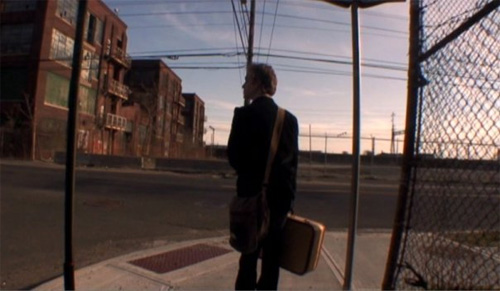
The best reaction I ever got for Zann was actually at its first public screening. It took place at the Desiderata Festival in Mohawk, NY, this massive 5-day rave in the middle of the woods with a small film festival on the side. Picture David Bowie’s equivalent of the Neverland Ranch and you’ll have an idea. Naturally, some of the guests were partaking in mild hallucinogens (mild is an understatement), and came into the screening without much knowledge of what was even being shown. By the time the finale came up, more than half of them just completely lost their bearings. Some were convulsing with fear, others just shrieking out loud, one guy actually got his nose bloody from banging his face against a chair. A lot of horror filmmakers can claim that they get good reactions from crowds, but I can proudly say that my film caused a room full of hippies to get bad trips and inflict bodily harm on themselves. Not to mention that all this took place in the barn where Teddy Roosevelt learned to box. It’s an immature thing to say, but I consider that the highlight of my career thus far.
PM: Do you always attend the festivals and screenings where your work is on display? What is it like to see your vision, your film, brought to life on a big screen in front of an audience of strangers?
JS: Unfortunately, as a recent college graduate, I’ve been forced to miss a good deal of festivals due to a lack of funds. It’s a shame, because I enjoy every nerve-wracking second of it. I feel extraordinarily lucky to be able to show my work alongside industry veterans, even though this is my first professional work. The experience of seeing the film on a giant silver screen in front of a large audience is probably the most exhilarating experience a filmmaker can have. It’s the ultimate goal, to have the images that swirl around in your head for months on end actually be put on display, to be seen by other people. Art is ultimately a means of communication through self-expression, and there’s no better way to see through another person’s eyes than through film.
PM: What is the value, if any, in witnessing audience reaction to your work? Do you enjoy those types of experiences? Why or why not?
JS: There’s nothing more sobering than having to subject your work to an audience has no stake in it personally. It’s one thing to show it to friends and colleagues who only want the best for you, but the audience of strangers couldn’t give less of a #&%$ about you if they tried. For all you know they’re just waiting for the next short in the block. If you can win a neutral audience over, then you can breathe easy, because you know you’ve got a good film. I was never certain about the quality of Zann, because audience reactions were so mixed. Hearing it get booed in Portland was like a punch in the chest, but eventually I realized that it was for the best. If I can gauge reactions judiciously, then I’ll be able to improve on my techniques with the next film.
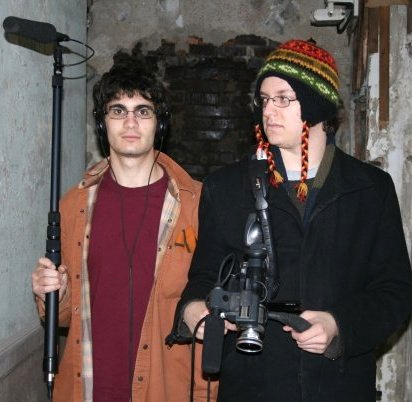
PM: At the RI International Horror Film Festival this past October, you discussed some of the difficulties you faced during the production of The Music of Erich Zann. Can you describe some of the hurdles you had to overcome (shooting on location with little/no electricity in cold weather, etc.) during the production process?
JS: The biggest lesson I’ve learned from production is that electricity is a valuable resource for film shoots (sarcasm, by the way). We shot the film in an abandoned hotel that still had electricity in its bottom floors. Unfortunately, the rooms with the best visual atmosphere were up on the top floor, so we were forced to run hundreds of feet of extension cords through the floors until we could reach the rooms. Even then, there was only enough electricity to power two lights at the most. Any more and everything would shut down for an hour. Because of that, we could barely provide any heating either. We were spending whole days in the middle of winter inside a solid concrete building that hadn’t been used for decades. We considered ourselves lucky if we could finish a day and still be able to feel our hands. It was more than worth it, though; the hotel gave the film such a palpable aura of dread that it wouldn’t have been half as good without it.
There were some occasions when we were very short on crew as well. This was a student production, so many times, scheduling conflicts were unavoidable, and essential crewmembers were unable to come. I wasn’t angry about it, sometimes #&%$ happens. At certain points I had to make do with just two people, including myself. I thought it was kind of fun though, like trying to finish a race on a burning Viking ship.
PM: In addition to screening your film at various other film festivals what other projects, if any, do you have in the pipeline? Are you currently working on or have any future plans for writing or directing another film?
JS: I’ve been developing a few different screenplays, mostly in the science fiction genre. Recently I read Ray Kurzweil’s book The Singularity is Near, which deals with where technology and society will be heading in the next couple of decades. It’s incredible, mind-blowing stuff and I feel like there’s a lot of untapped potential there in creating stories that combine 21st century technology with classical storytelling. Of course, I’ll still be making horror movies as long as I live. Derek Curley, the composer for Zann, and I are writing a kind of horror musical in the vein of Cab Calloway. Think of it as a Betty Boop cartoon with liberal amounts of gore.
PM: Just for fun — if you had limitless resources (think James Cameron) and could work on any project of your choosing, what would it be and why?
JS: I would love to be able to adapt Arthur C. Clarke’s Childhood’s End. It’s a book that’s so full of ideas about the power of knowledge, how societies work, and humanity’s destiny in the universe that it just begs to be put on the screen. So much science fiction cinema today is used more as commentary on the present. It’s all just allegories about the Bush years or obvious metaphors for racism that it feels like even when we look forward, we’re still stuck in the present. I want to use science fiction to inspire and speculate on where we as a society or species are heading, instead of just navel-gazing on where we are now. Where we are right now sucks, let’s try to think of something better!
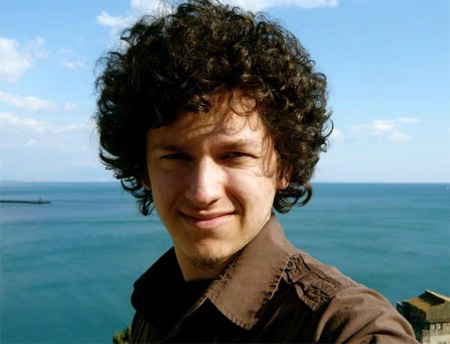
Now, with effects technology being capable of creating anything and making it convincing, it seems possible to put such an elaborate and epic story like Childhood’s End on screen without making it look silly. Whether you liked Avatar or not, it’s opened the window of possibility as to what can be accomplished on film.
PM: Given the obstacles that face aspiring filmmakers like yourself, what role, if any, do you see the unfavorable status of our economy playing in the realm of low budget independent filmmaking?
JS: If anything, it’s made independent filmmakers afraid to take risks. A lot of filmmakers I’ve talked to recently seem to be putting their passion projects on the backburner and focusing their energy and resources on more conventional stories, whatever the hell that means. You can see that mentality already in independent films; there is not a single plot development or line of dialogue in (500) Days of Summer that hasn’t been run into the ground already by Hollywood. Ultimately, I think that’s going to be a self-destructive mindset for the whole realm of low-budget film, because they’re going to be losing their identity as “independent.” They’ll be so afraid of losing money that they’ll give up the very uniqueness that might have gotten them noticed in the first place. Audiences are starved for something new, and no one is providing it anymore.
PM: If you could give other aspiring filmmakers, actors, writers, directors, etc. advice, what would you tell them?
JS: I would say above all things to be passionate and be persistent in achieving your goals. Enthusiasm is contagious, so be sure to infect everyone around you. Filmmaking isn’t easy and it isn’t meant to be, but the thrill and sense of accomplishment you get after each day of shooting is worth every setback or misstep. Don’t be disheartened by failure, you can only learn from it and keep going.
Most of all, I’d say this: If Tommy Wiseau could get a film like The Room greenlit with a $7 million budget, then you can get your film made too. That knowledge has gotten me through more bad days than one could possibly fathom.
PM: As you know, our website is called Fandomania, mainly based on our focus on fandom and love of all things geeky — from video games and movies to television, novels and comic books. What are a few things that you are a fan of and why?
JS: I’d be lying if I said I was an expert in all matters, but I relish any opportunity to immerse myself in things geeky. I’ve adored comics since I was 5 and rummaged through my dad’s DC and Marvel collections. I know more about the X-Men than should be legal, though I’ve been out of the loop with the comics in the last couple of years.
My biggest passion is with genre films, can’t get enough of them. Sci-fi, fantasy, horror, Westerns, you name it and I’m slobbering all over it. It’s really one of the best things that a film can do, take an audience to a world that shouldn’t exist or doesn’t anymore, and make it as believable as the parking lot outside the theater.
That, and pancakes. I am a fan of pancakes.


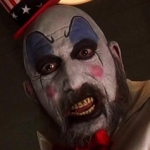

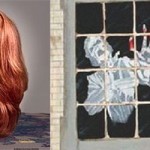

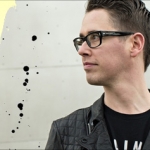
It fills us with pride to know that we have a producing relative of successful cinema, continues forward and do not stop innovating towards the excellence you we love you and we know that you to being what you propose.
Regards and embraces
Magdalena Auz Ecuador
Què gusto nos da el saber que Jared està rumbo al èxito, es dificil pero estamos confiados en que saldrà adelante, por si acaso acà puede conseguir un latin lover o talvez para una pelìcula de terror?????????
Saludos a todos.
Juan Carlos E. H.